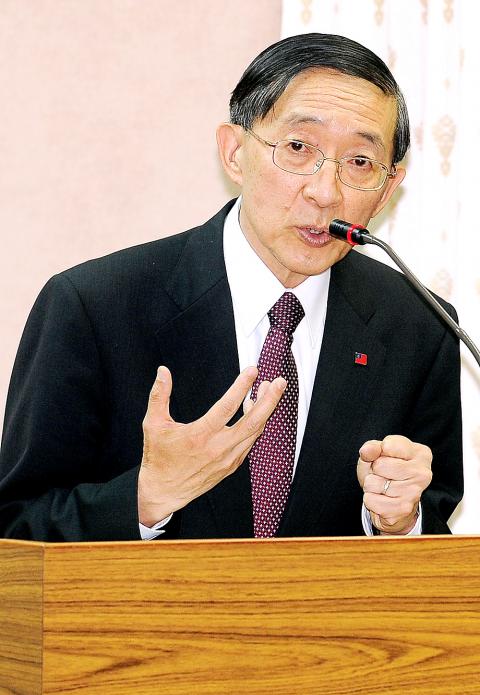|
China increasing
pressure: lawmakers
HARD LINE? Taiwan’s invitation to a defense
dialogue was canceled at the last minute after Chinese complaints, following
similar protests against Japan and the Holy See
By Shih Hsiu-chuan / Staff reporter

Minister of Foreign Affairs David
Lin answers questions at the Legislative Yuan in Taipei yesterday.
Photo: Chu Pei-hsiung, Taipei Times
As a spate of incidents have drawn
concerns from lawmakers about a squeeze on Taiwan’s international space under
China’s new leadership, Minister of Foreign Affairs David Lin (林永樂) yesterday
said he could not say with any certainty that this was the case, but vowed to
look into it.
The withdrawal of an invitation to a Taiwanese delegation to the third Jakarta
International Defense Dialogue (JIDD) hosted by the Indonesian government last
week, the latest case demonstrating China’s intolerance for Taiwan’s
international involvement, prompted lawmakers to urge Lin to pay close attention
to the new Chinese leaders’ cross-strait policies.
At a meeting of the legislature’s Foreign Affairs and National Defense
Committee, Democratic Progressive Party Legislator Hsiao Bi-khim (蕭美琴) said
there were signs of China intensifying suppression of Taiwan’s international
participation after Chinese President Xi Jinping (習近平) took power.
The JIDD incident followed China’s protest to Japan after it gave Taiwan’s
representatives the same treatment as official foreign envoys at a ceremony
commemorating the second anniversary of the March 11, 2011, earthquake and
tsunami and Beijing’s demand that Vatican cut diplomatic ties with Taiwan, Hsiao
said.
Hsiao asked Lin if the withdrawal of the delegation was a voluntary decision
made by the government “to refrain from offending China” or came after the
invitation was canceled.
Lin said it was a decision made by the Indonesian government at the last minute
after the Chinese embassy in Jakarta filed a protest against Taiwan’s presence.
Asked by Hsiao to protest to China over the incident, Lin said: “Certainly we
were displeased with mainland China.”
Lin said he hoped that China could realize that limiting Taiwan’s international
space has no positive effect on the cross-strait relationship and that it could
understand the necessity for Taiwan to participate in international dialogue
mechanisms.
“We will make it clear to mainland China through the appropriate channels,” he
said.
DPP Legislator Tsai Hung-liang (蔡煌瑯) asked Lin if he had noticed that China
adopting a more conservative position on cross-strait policy after Xi assumed
the presidency and Li Keqiang (李克強) was named premier.
The Xi-Li administration aims to unify Taiwan during their tenure by playing
Chinese chess — using gradual economic integration with Taiwan to annex Taiwan
politically, and by playing weichi, or Go — blocking its international space
diplomatically, Tsai said.
He said that the government should react strongly to the JIDD case.
“If not, it could trigger a domino effect. Chinese diplomatic officials could
relentlessly repress Taiwan if they thought the Xi and Li have tightened policy
against Taiwan,” he said.
Lin said that he could not say for sure that a change in policy toward Taiwan
under Chinese new leadership has taken place, but that he would look into the
matter.
Chinese Nationalist Party (KMT) Legislator Chen Cheng-hsiang (陳鎮湘) said the
government lacked a grasp of China’s Taiwan policy under Xi’s leadership and
thus failed to take precautionary measures to prevent such incidents from
happening.
Lin told Chen that Representative to Indonesia Andrew Hsia (夏立言) has lodged a
complaint with the Indonesian government over what he called its “unfair”
treatment toward Taiwan and expressed the wish that Taiwan be invited to the
conference next year.
|
![]()
![]()
![]()